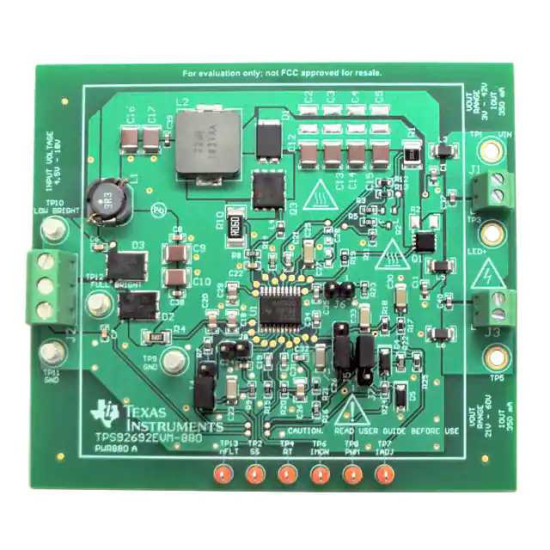
- Наличие: Под заказ 3-4 недели
Оценочный модуль, драйвер светодиода с повышением к батарее, питание последовательных светодиодов.
The TPS92692EVM-880 from Texas Instruments is a TPS92692-Q1 boost and boost to battery LED driver evaluation module. It is fully assembled and tested LED driver that can be configured as either a boost or a boost to battery topology to power a single string of series connected LEDs. Accurate closed-loop LED current regulation is achieved using a low offset rail to rail current sense amplifier along with high side current-sensing implementations. DC LED current set point can be varied over a 15:1 ratio using high-impedance analogue adjust (IADJ) input. PWM dimming of LED current is achieved by directly modulating the PWM/DIM input pin with the desired duty cycle or by enabling the internal PWM generator circuit. Optional PDRV gate driver output can be used to drive an external P-Channel series MOSFET. It supports continuous LED status check through the current monitor (IMON) output. Includes open drain fault indicator output to indicate LED output overvoltage & undervoltage conditio
- Versatile LED driver capable of driving a string of 1 to 20 series-connected white LEDs
- Wide input voltage range of 4.5V to 18V
- Better than ±4% LED current regulation using a high-side current sense resistor
- Spread spectrum frequency modulation for improved EMC
- Internal analogue voltage to PWM duty cycle generator for stand-alone dimming operation
- Supports boost, buck-boost (boost to battery), SEPIC and flyback LED driver topologies
- Supports automotive start-stop and load dump transients up to 65Vmax
| Характеристики | |
| SVHC (Особо Опасные Вещества) | No SVHC (27-Jun-2018) |
| Вес | 10г |
| Выходное напряжение | 40В |
| Выходной Ток | 350мА |
| Количество Выходов | 1выход(-ов) |
| Максимальное Входное Напряжение | 18В |
| Микросхема Ядра | TPS92692 |
| Минимальное Входное Напряжение | 4.5В |
| Содержимое Комплекта | Оценочная плата TPS92692 |
| Тип Управления Затемнением | ШИМ |
| Топология Устройства | Повышающий (Step Up) |
